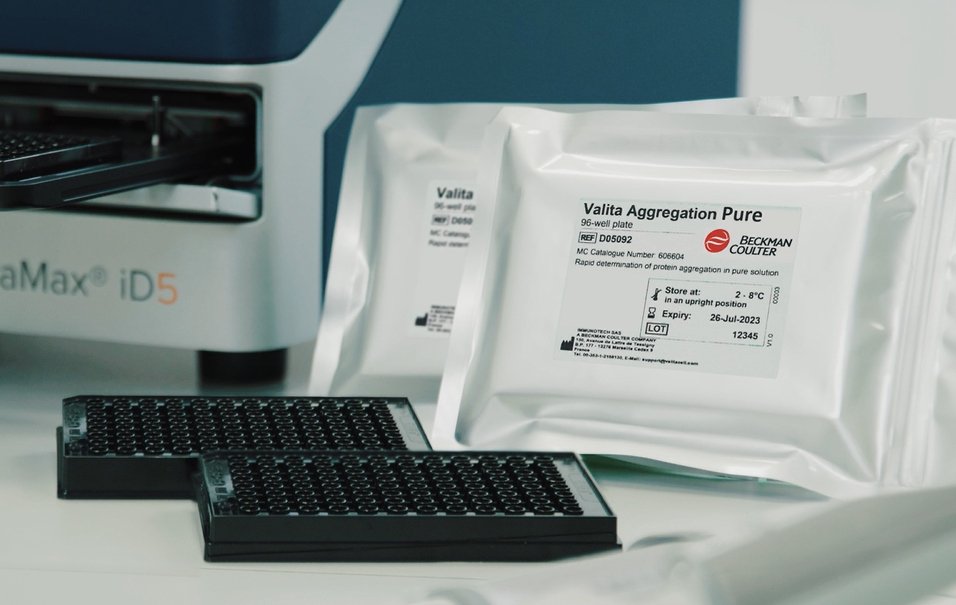Beckman Coulter Life Sciences Launches 15-Minute Valita Aggregation Pure Assay for Protein Detection
06 June 2024 | Thursday | News

Beckman Coulter Life Sciences, a global leader in laboratory automation and innovation, continues its mission to reduce workflow times and grueling manual steps with the launch of its new Valita Aggregation Pure assay. The plate-based 96-well screening tool offers rapid, high-throughput protein aggregation detection and quantification, providing robust aggregation data in as little as 15 minutes.
Traditional workflows in monoclonal antibody production require long wait times of up to six hours to determine protein aggregation levels. The new Valita Aggregation Pure assay from Beckman Coulter Life Sciences cuts through the clutter, delivering a rapid solution that is among the fastest and simplest aggregation detection tools on the market, and is compatible with high-performance microplate readers with fluorescence polarization functionality.
“Processing thousands of samples to generate a commercially viable cell line is a complex and tedious process that can slow laboratory workflows,” said Dr. Elisa Nent, Global Product Manager - Cell Health. “We continue to hear the critical need to rapidly measure antibody aggregation faster than traditional DLS/SLS and HPLC-SEC methods. Our innovation slashes manual steps, the need for additional reagents, and added expense – all in a fraction of the time. We’re confident this will allow laboratory staff to get results faster and focus their efforts on critical research goals.”
The new assay enhances the process development workflow by enabling detection and quantification of antibody aggregation at any stage of time. In less than 15 minutes, aggregation can be quantified by simply adding purified samples to the plate, incubating at room temperature, and measuring aggregation using a plate reader. Available as 96-well plates and validated with samples concentrated between 200- 2,000 milligrams per liter, with a detection limit of 0.5% aggregation at 1,000 milligrams per liter, it enables rapid, high-throughput protein aggregation analysis.
Most Read
- Top 25 Biotech & Biopharma Leaders in Sustainable Innovation, 2025
- China’s Biopharma Dealmaking Surges in H1 2025, Driven by Record Licensing and Oncology Focus
- Chikungunya in China: How a “Forgotten” Arbovirus Found the Perfect Storm
- How Innovation Gaps in Biopharma Raise New Safety Concerns
- Smart Implants and the Future of Musculoskeletal Injury Treatment
- How Ethical Gaps in Psychiatry Could Undermine Biopharma Progress
- The Evolving Landscape of Women’s Health Innovation in the Asia-Pacific
- Using NLP-Driven Decision Support in Emergency Health Assistance
- Taiwan Steps Into the Global Spotlight With a New Cancer Therapy
- The Role of Unique Device Identification (UDI) in Tracing Medical Device Safety
- The Importance of a Patient’s Mental Health During Clinical Trials
Bio Jobs
- The State of Biotech and Life Science Jobs in Asia Pacific – 2025
- Avantor’s New CEO Ligner Aims to Unlock Global Potential and Deliver Shareholder Value
- AstraZeneca Commits $50 Billion to U.S. Expansion by 2030 in Biggest-Ever Global Investment
- Thermo Fisher, SAMRC, and South Africa’s Department of Science and Innovation Launch CATIR to Nurture Next-Gen Scientists
- Cube Biotech Appoints Former Sartorius CEO Dr. Joachim Kreuzburg to Board of Directors
- FDA’s AI Transition Marks a Turning Point in Drug Review: Industry Faces Pressure to Adapt Amid 20% Workforce Cut
- WuXi XDC Completes Mechanical Build of Singapore Bioconjugate Manufacturing Hub
News
Editor Picks











